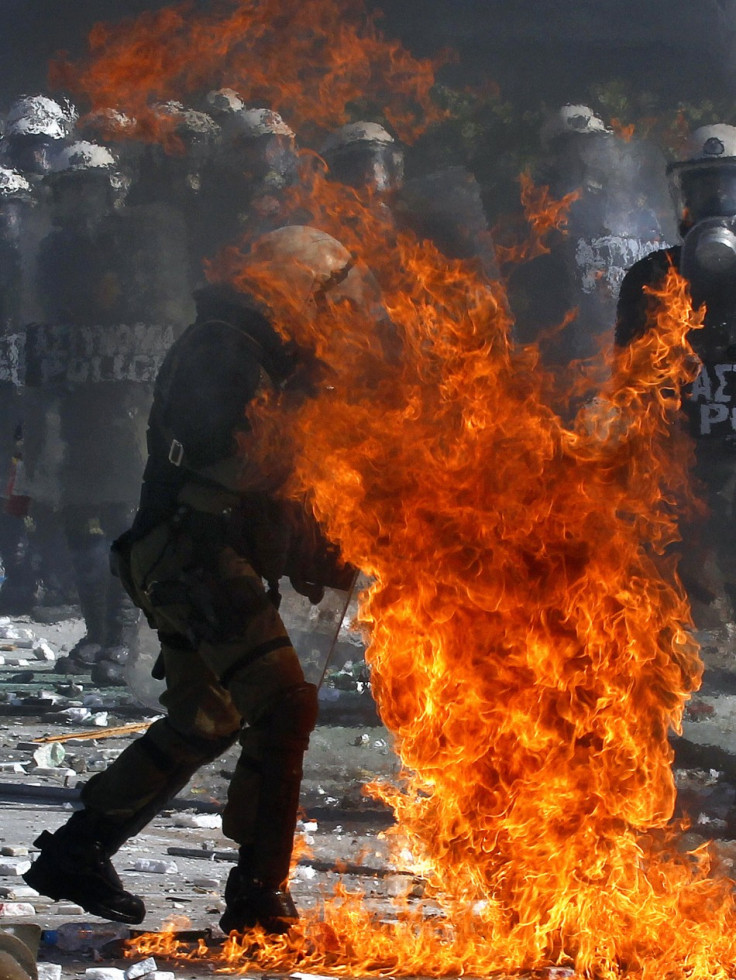Greece: Ruling Party Weakened and 1 Dead in Protests after New Cuts are Approved

Protests in Greece refused to die down and violence escalated Thursday, leading to the death of one protester, as Greek lawmakers narrowly passed a second package of austerity measures, which further weakened the country's ruling Socialist party.
Greece's Parliament approved the austerity measures by a vote of 154 in favour and 144 against, but a twist saw the Socialist government's majority reduced after a lawmaker was expelled for not keeping in line with the party's line. Two lawmakers were also not present to vote.
The new package has also led to further public discontent, as demonstrators took to the streets to protest against their government's economic policies.
The newly passed measures include pay and staff cuts in the civil service as well as pension cuts and tax hikes for all Greeks.
Tensions arose within the leading party after former Labour Minister Louka Katseli, who voted in favour of the overall bill, opposed an article reducing collective labour bargaining rights.
Angered by Kasteli's move, Prime Minister George Papandreou decided to expel her from the party's parliamentary group, leaving his parliamentary majority to 153.
Tensions also emerged in the streets as protests left one person dead and 74 injured, with demonstrators reportedly throwing stones.
Tens of thousands of people gathered outside the Parliament building to denounce the austerity package, and the action coincided with a second day of a 48-hour general strike that paralyzed public services across the country.
Violent clashes erupted after groups of masked violent protesters clashed with demonstrators from Greece's Communist-led Pame union, armed with firebombs and throwing stones, according to reports.
As streets battle erupted around the city's main Syntagma Square, riot police intervened to try and stop the violence from spilling further, but confrontations lasted throughout the afternoon.
More the 70 people were injured during the confrontations and a 53-year-old union protester with a previous history of heart problems died from a heart attack after inhaling tear gas fired by police during the demonstration, a hospital official said.
The austerity package voted Thursday is expected to be the last set of measures taken by the Greek government, under pressure from, the European Union, the International Monetary Fund and the European Central Bank to prevent the country from further spiralling into the economic crisis.
The last set of legislation passes was a prerequisite for the release of the next tranche of aid, which amounts to €8 billion.
The sentiment was echoed by Socialist party heavyweight Vasso Papandreou who told Parliament during the debate on the measures: "This is the last time."
Finance Minister Evangelos Venizelos also issued an appeal to the opposition warning that that failure to approve the measures would be disastrous.
"If the law is not approved, including every single article it contains - particularly those that (Greece's creditors) and eurozone members regard a symbolic and political necessity - there is no need for me even to go to the eurogroup meeting on Friday, or the prime minister to Sunday's summit," he said.
"The country will be exposed to the danger of a non-rational development, and will once again serve as the scapegoat on which Europe's historic, political and institutional shortcomings will be dumped," Venizelos said.
The Socialist or Pasok party took to power in 2009 after a landslide victory, but after two years of austerity measures, the party's popularity has plummeted and the last months have been marked by anti-government protests.
The vote comes before Sunday's summit of European leaders, who are expected to come up with a comprehensive solution to the bloc's debt crisis.
European finance ministers are also due to meet Friday to announce whether to release the next tranche of aid for Greece that is part of a €110 billion ($151.6 billion) bailout the country received last year.
© Copyright IBTimes 2024. All rights reserved.





